It looks like you're using an Ad Blocker.
Please white-list or disable AboveTopSecret.com in your ad-blocking tool.
Thank you.
Some features of ATS will be disabled while you continue to use an ad-blocker.
share:
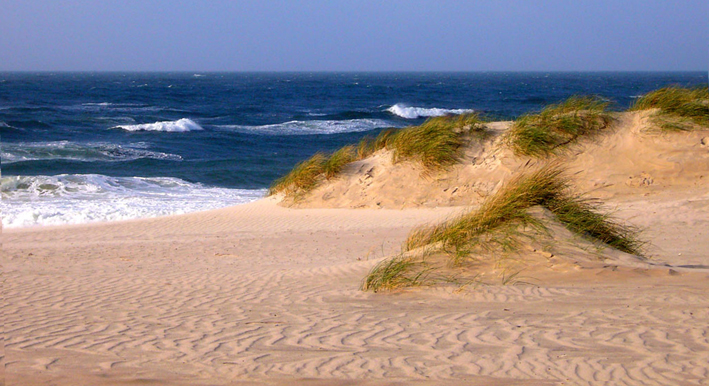
She’d inherited the island. It was a curved spit of tall dunes and long green grasses shaped in a half moon, where a few wild horses ran, chasing the wind off the New England shore. It was a mile long, and a half a mile in the thickest part of the middle, where the C-shaped rear of the isle aimed back at the coast, and the opposite side opened its arms to the wide blue sea.
There was a small crooked shack, made of driftwood the color of dove’s wings, soft and worn and full of holes. She stored her tools and memories in it; shells that washed up, a rope coiled round a life preserver donut with the faded letters “S. S. Gull” printed along the edge, a scrap-wood bench with hammer and tins of nails, a screwdriver, a hand saw, a tackle box and fishing pole, a long handled oar.
She walked the morphing line of the early morning pre-dawn beach, the place where earth and water met, and sank her feet, pulling her this way, and that. The air was filled with the remains of summer, a breeze of brine and sweet fresh air, a hint of crispness in the purple sky that pushed her to walk this last time along the edge of the world. Her world. (A horse whinnied over the dunes, a gull cried before diving down to snatch a fish, the sea lapped her feet cold and warm and foamy all at once.)
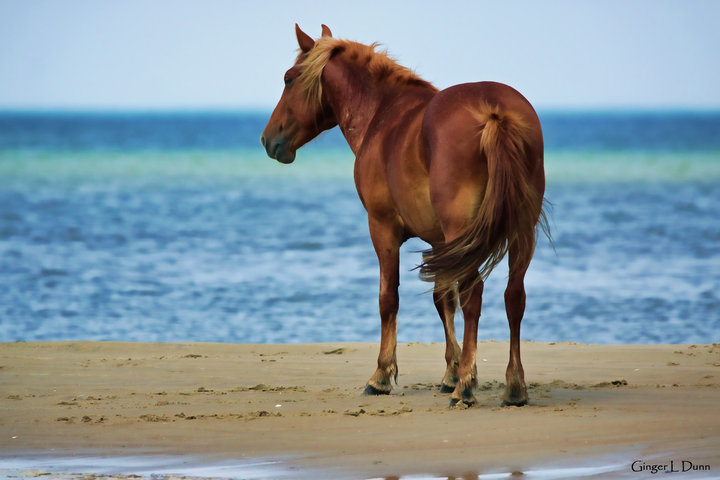
She had a bucket in her hand, filled with clams. She held her favorite digger in the other. She would steam them underneath a fire for her lunch, piled between stacks of seaweed, along with a few potatoes, as she did most days. She’d made the last of her salt-water sourdough bread last night, and had baked the risen dough this morning in the brick oven she’d built four summers ago next to the tight little storm-weathered house. Her small greenhouse was nearly done, its pole beans and a few bright lemons, zucchini squash and heirloom tomatoes, along with the shelves of culinary and healing herbs, were down to one more meal’s-worth and a couple leftovers to take home on the boat.
The boat, a second incarnation of the old Gull, would be waiting for her; white with a sail to pitch, an anchor to haul, an oar to push off and aim her back to the crash and heave of the electronic world, where her college students mostly stared into the void of their own minds while Tennyson rolled over in his grave and Chaucer simply laughed. The world of division, it was. The world where appearances on social media mattered, where money and things were set up as the objects of desire and to have them divided people from their own hearts as often as not. It was a strangers world, to her, where prayers clashed as easily as politics. She did not know if she could bear it again.
Still, it was a very long way to retirement. The island was only good during certain months — a winter here, without proper supplies, would be deadly in a slow, cold and starving sort of way. The horses survived it. She’d rescued them from death at the hands of land managers who did not see their worth or know how to handle their needs.
She’d brought them here on a rented barge, frightened and busting mad. They had instantly adapted and they would live or pass on naturally here, with no enemies to hunt them, and no one to upset with their trampling hooves. She helped them a little. Fierce and proud, they would eat the hay she left for them and huddle in sheltered places she had built when the grasses died and the snow howled, barreling towards the city like a fist. She left them good things, and they did not die — it was a worthy trade for watching them run, leaping and kicking and free. Free. Yes. For all its confinement, all its hard ways, freedom was the most plentiful resource on the island.
She wrote every day, monk-like, filling notebooks and drawing sketches too — a shell, a stand of grass on the dunes, a grey horse in the surf. It was it’s own food, this daily scrawl, and it amplified her soul even as her body wasted from low-calorie living. She didn’t care. She fed herself into her books.
Everyone said how healthy, how trim and tanned she looked after her island vacation, imagining palm trees and sipped liquor out of coconuts. Instead, she’d reveled in starkness, in a harsh and constant beauty. She curled into herself here, mindfully and willfully, fortifying her shell for The Return, carrying the island around her like a conch. Always, always she heard the ocean within, the rhythm and harmony of waves against the brittle bite of Real Life. That was what it meant to live in a shell.
While writing, she culled words like clams, tossing the unappealing aside, washing and washing and refining out the dross of those she cared to keep. She would publish them in some obscure little press for poetry no one read, or perhaps she would package it for the web, that spider’s nest of marketing. She was brewing a novel with her morning tea, which felt cliche and far too fashionable. Everyone she knew was writing one, it seemed.
She was still young enough to miss his body next to hers, young enough to remember how summers on the island used to be second, third, fourth and a final seventh honeymoon before the cancer took the light from his eyes and the doctor’s couldn’t cut any more of him away.
She saw his ghost, smiling, in the corner of her eye, and she knew she would never bring a man here to this sacred place. She’d never found even a close second to his hazel eyes and supple humor, nor any who captured her attention, mind to mind, heart to heart, as he had. It had been seven more years since his ashes met the island sand. Seven years of solitude. Seven summers alone with her wild heart and his memory so strong in her that sometimes she could swear he breathed next to her in bed.
Summer’s end was sorrow, a kind of death along with the harvest of her words.
She set the bucket down by the hole she’d made, already lined with flat rocks and filled with a lit driftwood fire started from the coals of yesterday, before she’d even gone after the clams. She stirred it with the shovel a bit, liking the heat and coals. She would go down to the water and wash the shellfish again, four more times, as she always did, but not for a few more minutes.
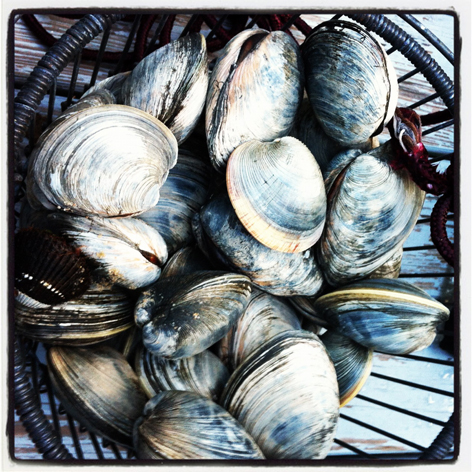
Now she enjoyed the sunrise, sitting comfortably on a rock. The next to last sunrise. It was always bitter-sweet.
The red-orange-pink-yellow color that didn’t have a name was splashing and shifting across the thin, windy clouds as the red sun rose. (She could hear the horses again, down closer to the dock, it seemed.) A hand met her shoulder for a moment. Fingers touched her cheek. She turned to look, finding no one there. No one visible. She smiled.
“Yes,” she said to the breeze, “I’ll come back again, next year.”
A crow flew overhead. They didn’t often venture out to the curve of dunes they’d named “Treasure,” as a joke. The iridescent bird dropped something into the sand nearby, then flitted off with a jaunty, throaty cry. Something shiny lay near her foot. She reached for it, plucking it from the sand.
(Continued)
edit on 15-9-2016 by AboveBoard because: SEWC
edit on 15-9-2016 by AboveBoard because: (no reason
given)
edit on 15-9-2016 by AboveBoard because: (no reason given)
a reply to: AboveBoard
Her hand opened, the sand fell away. Her breath caught and her heart beat against it’s calcification. How did this come here? How? She looked up and around wildly, but the bird was gone.
Then she turned the hair-clip, heavy and golden, over in her hand, an impossible relic. Wonder filled her eyes, drawing them open wide. She had worn it on their wedding day, and lost it somewhere in the sea while swimming on their first honeymoon, here. How had it returned to her?
The world became tight and watery, her shell broke - an explosion of air from her lungs, her heart flew, exultant like the kicking hooves of the horses from one end of the isle to the other, free, really free. A wailing sound, a shout for joy escaped her lips, unconsciously, surprising her. “YES!” She shouted to the wind, to the waves, to the summer scoured sand. She flung herself up to her feet, arms wide, “YES!” She ran. She ran to the ocean, jumping, leaping, dancing, spinning her YES into the curve of the waters, the bit of gold held tight in her fingers.
“Yes, love,” she then whispered, kissing the gift of it, tears streaming, and she knew he was there, and would be there until the last of her days. “I will always come back…”
- - -
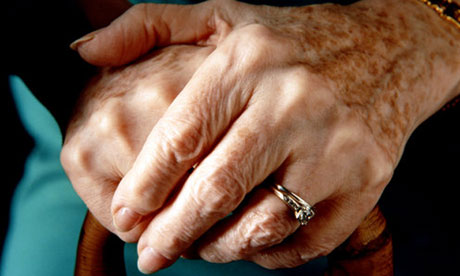
Old hands now, their years apparent in knots and wrinkles. Aching hands. They’d written seven novels and twelve volumes of poetry and and held more than one prize from The World. Now, however, The World had receded, was shadow and dust.
Now there was one more summer, and the edge of winter.
The horses were gone. She was not ever going back to the noise and confusion. It was time. Her nurse was with her, and her niece, too. They had her propped up on the tidy porch of the grey house, where she’d retired. It had a generator now, and solar panels. There was even plumbing. Clams were roasting on the beach. Fire scented the air with smoke like incense on the briny breeze. She held the bit of gold in her hand, rubbing it like a talisman, her eyes heavy, her breathing weak, a strange rattling sound in her chest.
They saw her smile, she knew, and she pointed listlessly to the sea.
He walked to her on the waves, tall and strong as she had known him, his white pants rolled up and his hippy tunic shirt flapping loosely in the wind. She waved. Her nurse looked out and frowned.
She got up, then, and stepped lightly away, running joyfully down the steps to his waiting arms, leaving the shell behind. “Eternal summer,” she thought, as her nurse and niece gathered around what would be burned and scattered. “If there is a heaven, then here we’ve found it.”
“Welcome home,” he said, kissing her, slipping his hand around her waist.
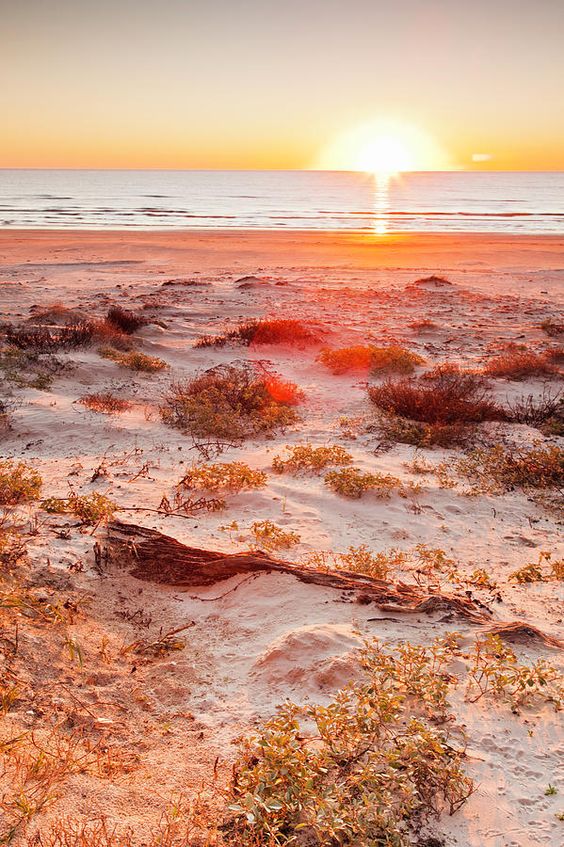
- THE END -
Her hand opened, the sand fell away. Her breath caught and her heart beat against it’s calcification. How did this come here? How? She looked up and around wildly, but the bird was gone.
Then she turned the hair-clip, heavy and golden, over in her hand, an impossible relic. Wonder filled her eyes, drawing them open wide. She had worn it on their wedding day, and lost it somewhere in the sea while swimming on their first honeymoon, here. How had it returned to her?
The world became tight and watery, her shell broke - an explosion of air from her lungs, her heart flew, exultant like the kicking hooves of the horses from one end of the isle to the other, free, really free. A wailing sound, a shout for joy escaped her lips, unconsciously, surprising her. “YES!” She shouted to the wind, to the waves, to the summer scoured sand. She flung herself up to her feet, arms wide, “YES!” She ran. She ran to the ocean, jumping, leaping, dancing, spinning her YES into the curve of the waters, the bit of gold held tight in her fingers.
“Yes, love,” she then whispered, kissing the gift of it, tears streaming, and she knew he was there, and would be there until the last of her days. “I will always come back…”
- - -

Old hands now, their years apparent in knots and wrinkles. Aching hands. They’d written seven novels and twelve volumes of poetry and and held more than one prize from The World. Now, however, The World had receded, was shadow and dust.
Now there was one more summer, and the edge of winter.
The horses were gone. She was not ever going back to the noise and confusion. It was time. Her nurse was with her, and her niece, too. They had her propped up on the tidy porch of the grey house, where she’d retired. It had a generator now, and solar panels. There was even plumbing. Clams were roasting on the beach. Fire scented the air with smoke like incense on the briny breeze. She held the bit of gold in her hand, rubbing it like a talisman, her eyes heavy, her breathing weak, a strange rattling sound in her chest.
They saw her smile, she knew, and she pointed listlessly to the sea.
He walked to her on the waves, tall and strong as she had known him, his white pants rolled up and his hippy tunic shirt flapping loosely in the wind. She waved. Her nurse looked out and frowned.
She got up, then, and stepped lightly away, running joyfully down the steps to his waiting arms, leaving the shell behind. “Eternal summer,” she thought, as her nurse and niece gathered around what would be burned and scattered. “If there is a heaven, then here we’ve found it.”
“Welcome home,” he said, kissing her, slipping his hand around her waist.

- THE END -
edit on 15-9-2016 by AboveBoard because: (no reason given)
OMG AB, this was magnificent! What a touching and beautiful story! I could feel every emotion, see the animals and nature come alive in my mind. I
could see 'her' as she aged through the years with her youthful, longing spirit. WOW!!!!!!!
a reply to: AboveBoard
Wow!
Very touching and heartfelt. Single best short story I've read here by far. I suggest you look for a publisher.
Ps. Reminds me of 'Dear Esther', but a much happier outcome.
Wow!
Very touching and heartfelt. Single best short story I've read here by far. I suggest you look for a publisher.
Ps. Reminds me of 'Dear Esther', but a much happier outcome.
edit on 15-9-2016 by nightbringr because: (no reason given)
Brilliant!
I especially liked this part . . .
Is it a description of your writing methodology?
I especially liked this part . . .
While writing, she culled words like clams, tossing the unappealing aside, washing and washing and refining out the dross of those she cared to keep. She would publish them in some obscure little press for poetry no one read, or perhaps she would package it for the web, that spider’s nest of marketing. She was brewing a novel with her morning tea, which felt cliche and far too fashionable. Everyone she knew was writing one, it seemed.
Is it a description of your writing methodology?
a reply to: JDeLattre89
Thank you so much!
And I do cull my words when writing, and all that.
And all my writing is obscure...
- AB
Thank you so much!
And I do cull my words when writing, and all that.
And all my writing is obscure...
- AB
a reply to: nightbringr
Thank you, nightbringer. Is there a short story named "Dear Esther" or is it the game?? Forgive my ignorance!
I really appreciate you giving my SS a read...
- AB
Thank you, nightbringer. Is there a short story named "Dear Esther" or is it the game?? Forgive my ignorance!
I really appreciate you giving my SS a read...
- AB
originally posted by: AboveBoard
a reply to: nightbringr
Thank you, nightbringer. Is there a short story named "Dear Esther" or is it the game?? Forgive my ignorance!
I really appreciate you giving my SS a read...
- AB
Very sharp!
It's a game. Regardless, it's much more a story you follow along with, but yes is a game. The similarities are there though. Alone, on an island, with an unresolved ending.
That said, your ending is much more satisfying. I loved the story.
a reply to: AboveBoard
Abby I loved this! What a wonderful Tale!! S's+F seems such an insignificant gesture, but I gladly gave them... I am still heartwarmed, touched. That was beautiful!!!
Abby I loved this! What a wonderful Tale!! S's+F seems such an insignificant gesture, but I gladly gave them... I am still heartwarmed, touched. That was beautiful!!!
Absolutely beautiful.
Work is not a good place for a good cry though. LOL
Really wonderful.
Work is not a good place for a good cry though. LOL
Really wonderful.
My dearest Ab's...
You've done it once again darlin'.
I LOVE IT.
Gx
You've done it once again darlin'.
I LOVE IT.
Gx
edit on 16-9-2016 by Gordi The Drummer because: prudence
originally posted by: Gordi The Drummer
My dearest Ab's...
You've done it once again darlin'.
I LOVE IT.
Gx
THANK YOU!!!
I really appreciate you, Gordi, and if not for the kind word and the encouragement, the would never have been written.
a reply to: AboveBoard
Och stop it Lass!
You're a shining star, and this flows so well from you!!!
Don't EVER doubt yourself.
Och stop it Lass!
You're a shining star, and this flows so well from you!!!
Don't EVER doubt yourself.
originally posted by: Gordi The Drummer
a reply to: AboveBoard
Och stop it Lass!
You're a shining star, and this flows so well from you!!!
Don't EVER doubt yourself.
I agree whole heartedly!!!!!!!!
new topics
-
The daily fail trying to imply “it’s aliens”
The Gray Area: 5 hours ago -
Swarms of tiny 'ant-like' robots lift heavy objects and navigate obstacles
Science & Technology: 6 hours ago -
NYPD Chief Jeffrey Maddrey Resigns - Forced Officers to Give Sex for Overtime Pay and Favors.
Posse Comitatus: 8 hours ago
top topics
-
The Carpet Coating that Attacked the Environment
Medical Issues & Conspiracies: 12 hours ago, 12 flags -
Microplastics in your drinks
Medical Issues & Conspiracies: 13 hours ago, 5 flags -
NYPD Chief Jeffrey Maddrey Resigns - Forced Officers to Give Sex for Overtime Pay and Favors.
Posse Comitatus: 8 hours ago, 3 flags -
Swarms of tiny 'ant-like' robots lift heavy objects and navigate obstacles
Science & Technology: 6 hours ago, 2 flags -
The daily fail trying to imply “it’s aliens”
The Gray Area: 5 hours ago, 1 flags
active topics
-
The daily fail trying to imply “it’s aliens”
The Gray Area • 4 • : McGinty -
‘Something horrible’: Somerset pit reveals bronze age cannibalism
Ancient & Lost Civilizations • 12 • : McGinty -
The Carpet Coating that Attacked the Environment
Medical Issues & Conspiracies • 11 • : ElitePlebeian2 -
Spiritual Solstice
Short Stories • 12 • : Naftalin -
I have a friend. . .
General Chit Chat • 25 • : AdultMaleHumanUK -
Microplastics in your drinks
Medical Issues & Conspiracies • 18 • : Naftalin -
'Mass Casualty event' - Attack at Christmas market in Germany
Mainstream News • 139 • : SprocketUK -
Just spotted an unusual aircraft Melbourne Australia
Aliens and UFOs • 8 • : andy06shake -
Why isn't Psychiatry involved?
Social Issues and Civil Unrest • 29 • : GENERAL EYES -
An Interesting Conversation with ChatGPT
Science & Technology • 33 • : GENERAL EYES
